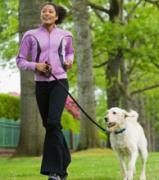Zooeyia: The Positive Health Benefits of Animals in our Lives

Zooeyia: The Positive Health Benefits of Animals in our Lives
Did you know a pet can improve your family’s health? Zooeyia (ZOO-ey-ah) is a recently invented word to describe the health benefits of pets.
This new word was coined from the Greek root words for animal (zoion) and health (from the Greek goddess of health, Hygeia). The inventors of the word consider it the opposite of zoonosis, which refers to diseases transmitted from animals to man or vice versa.
We all want our families to be healthy, but just how do pets improve our health and the health of our families?
In his recent book, Spontaneous Happiness, Dr. Andrew Weil includes a chapter entitled “Relate to companion animals,” where he writes about the gift of spontaneous happiness and emotional health that comes from relationships with pets. Two recent news stories have suggested dog ownership improves physical health as well. Dog ownership decreases the risk of developing a cold or asthma, and having a pet in the home results in healthier kids.
But there are other important health issues recently identified by the Institute of Medicine of the National Academies. Here are four of the twelve leading health indicators that pets can contribute to:
1. Pets increase exercise
American families have become couch potatoes, resulting in an epidemic of obesity and diabetes in both children and adults. One of the goals of the Institute of Medicine is to increase healthy behaviors, such as exercise. Dog owners exercise more than non-dog owners due to the dog’s requirement for exercise, and children in dog-owning families exercise more as well.
2. Pets lessen the impact of chronic disease
The occurrence of chronic diseases, such as cancer and cardiovascular disease, places a heavy financial and emotional burden on the family. Another of the Institute of Medicine’s goals is to decrease the impact of chronic diseases on the population, including cardiovascular disease and cancer. Cats have been shown to decrease the risk of cardiovascular disease in their owners, and the presence of a pet in the life of a cancer patient has been shown to provide great comfort and support during cancer treatment.
3. Pets promote community
In our increasingly urbanized society, loneliness and isolation can occur, especially among elderly family members who live alone. Pets also help promote a healthy social environment within their community, not just for their owner, but for all members.
Communities with pets benefit from more civic engagement, neighborliness, and community spirit, contributing to a decreased sense of loneliness within the community.
4. Pets facilitate smoking cessation
Smoking-related illnesses rob smokers of their health. Family members who do not smoke should be coached not to pick up this habit and those who do should be encouraged to stop. Pets living in a home with a smoker suffer from the effects of secondhand smoke just like children do. If smoking pet owners are made aware of the risks to their pet, research has shown it can motivate some smokers to quit, due to the risks to their pet.
One small furry pet can give your family all these benefits and a good deal of fun and love as well.
Share Your Thoughts: How have your pets benefited your or your family’s health? Share your experiences in the comments section below.


































